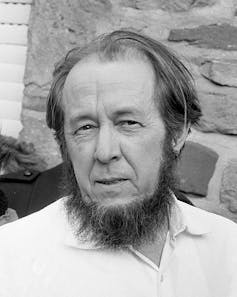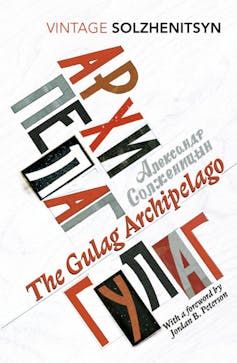last year, Vintage Classics ( a division of Penguin U.K. ) republished an abridge version of The Gulag Archipelago by Russian cerebral, novelist and 1970 Nobel Prize recipient role Aleksandr Solzhenitsyn. The monumental book about the Communist Soviet forced labour camp organization has been republished and reprinted multiple times and translated into many languages .
As a scholar of the Gulag I often use this book, which is frequently assigned in classrooms .
Why did Vintage Classics ask Peterson, who is a professor of psychology based at the University of Toronto, to write the presentation ? And why did he actually write it ?
Peterson has no education in the study of the Gulag or in russian history. He briefly mentions the Gulag in his first script, but his inquiry and notoriety surely lie elsewhere .
The option of Peterson to write an presentation to a record on the history of soviet prisons seems, on the depart of Vintage Classics, at least a silent endorsement of Peterson ’ s controversial statements related to issues of gender, sex, postmodernism and release address .
Peterson ’ s notoriety dispersed when he refused to use students ’ choose pronouns. He provides intellectual justifications for the men who refer to themselves as incels and has appeared to support, or at least find coarse induce with, far correct politicians, such as Hungary ’ s Prime Minister Viktor Orban .
What the scholarship says
In his forward, Peterson cites no scholarship on the Gulag except for the highly controversial 1997 Black Book of Communism. That 1997 bible was published at the early stages of archival research into communist repression by a group of european researchers. Among scholars of the Soviet Union, it is seen as more of a polemic than an academician work. Stanford historian Amir Weiner described the koran in the Journal of Contemporary History, as “ seriously flawed, incoherent, and frequently prone to mere aggravation. ”
But there have been dozens of academic and popular books on the Gulag published since then, many of which have complicated Solzhenitsyn ’ south picture. In his initiation, Peterson makes no try to reflect on the meaning impact of Solzhenitsyn ’ s work on the academic discipline of the Gulag .
Solzhenitsyn did not have archival access for his own research, and relied on his experiences and the accounts of other prisoners. Once the archives started opening in the late 1980s, researchers were able to examine former classified materials on the Gulag .

THE CANADIAN PRESS/Jason Franson
My research, and that of historian Alan Barenberg based at Texas Tech University, has challenged Solzhenitsyn ’ sulfur characterization of the Gulag as an archipelago of camps largely isolated from soviet society. We have described stir and porous camp borders in many areas .
These camps incarcerated big numbers of prisoners who interacted regularly with non-prisoners both inside the camps and external of the camps, sometimes evening without guards. other inquiry has suggested that some attempts at re-education in the Gulag may have been more significant and effective than Solzhenitsyn contends .
so far a lot of Solzhenitsyn ’ sulfur word picture has been confirmed by archival analysis. While the extent of the destruction of lives and bodies through forced tug continues to be debated, there is no doubt that it took target on a large plate, and was an integral component of the Gulag system as it existed .
Solzhenitsyn ’ randomness word picture of the camps as “ destructive-labour camps, ” quite than the official “ corrective-labour camps ” is frankincense largely an apt one. archival documents confirm the incredibly harsh conditions and ferociousness of the Soviet camp system .
History is complicated
Readers will not get an assessment of the stream scholarship about either Solzhenitsyn or the Gulag in Peterson ’ south introduction. rather, readers will read from Peterson a fulmination against communism and in favor of western individualism.
Read more: 15 Mystery Series That’ll Keep You Guessing
Peterson eschews any guise of critical think on behalf of the subscriber. He lets readers know that the merely logical termination and intelligent response to reading Solzhenitsyn is a rejection of communism and “ group identity. ” Peterson writes the Gulag demonstrates that “ the doctrine of group identity inevitably ends with everyone identified as a class enemy, an oppressor, ” frankincense guaranteeing repression .

Wikimedia commons
Peterson touches on the affect of Solzhenitsyn in entirely two respects : the “ primary function ” of The Gulag Archipelago in bringing down the Soviet Union and the impact on “ radical leftists ” outside of the Soviet Union. He writes, for exemplar, that The Gulag Archipelago drove the “ radical leftists … underground ( where they have festered and plotted for the final 40 years ). ”
I am not certain what he means by this. And anyhow, he misses the important distributor point that many on the french leftover, in finical, publicly renounced communism quite than going underground, following the koran ’ mho publication .
The book surely played a function in undermining the repute of the Soviet Union, but as many historians will agree, there are no singular leading roles in history. The Soviet Union ’ s eventual crumble was tied to respective factors, excessively numerous to count .
The issues raised are more complicate than Peterson suggests .
The responsibility of the scholar
Peterson views the The Gulag Archipelago as providing clear testify against communism and group identity, and in prefer of western individualism, but Solzhenitsyn did not draw this stopping point .

Penguin Vintage
Solzhenitsyn strongly rejected communism. But he besides, based on his experience surviving in the United States, rejected westerly individualism .
Peterson ’ s reason of the Gulag seems both limited and dated, and his YouTube video speaking on The Gulag Archipelago is riddled with actual errors. These facts make Peterson an odd choice for an academician voice on this submit .
possibly Vintage Classics employed a certain logic when they chose Peterson for this fore. Both Peterson and Solzhenitsyn are and were well known anti-communists, and conservative public intellectuals ( possibly the reason that the Massachussetts-based Solzhenitsyn Center has praised this version ).
possibly Peterson helps to sell books and the Gulag Archipelago reach a wide audience. But is Peterson ’ mho voice in truth one that needs further amplification ?
What is the character and duty of the academician and public intellectual, when asked to write about an area outside their area of expertness ? Hopefully the answers to these questions, for those at Vintage Classics, go beyond a desire to sell more books .
[ Expertise in your inbox. Sign up for The Conversation ’ s newsletter and get a digest of academician takes on today ’ randomness news, every day. ]


